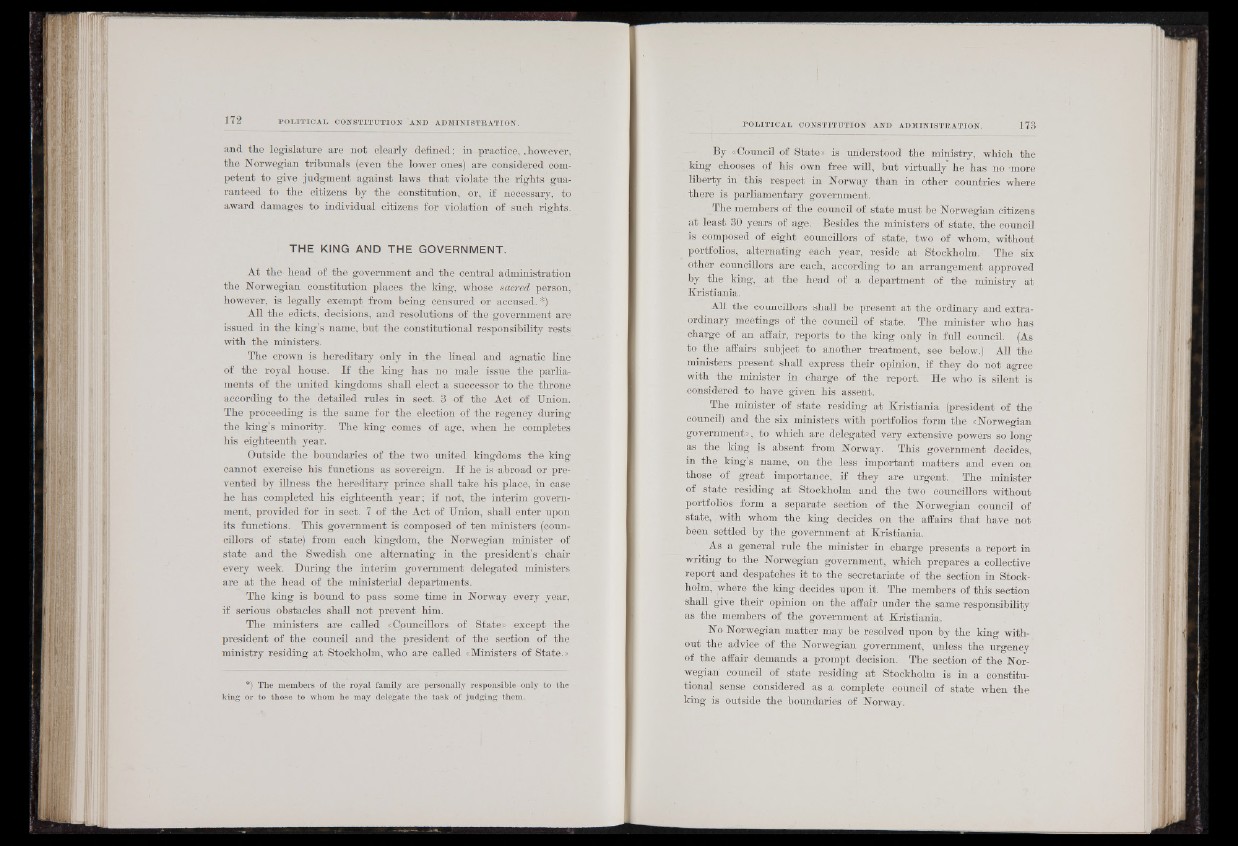
and the legislature are not clearly defined; in practice, .however,
the Norwegian tribunals (even the lower ones) are considered competent
to give judgment against laws that violate the rights guaranteed
to the citizens by the constitution, or, if necessary, to
award damages to individual citizens for violation of such rights.
THE KING AND THE GOVERNMENT.
At the head of the government and the central administration
the Norwegian constitution places the king, whose sacred person,
however, is legally exempt from being censured or accused. *)
All the edicts, decisions, and résolutions of the government are
issued in the king’s name, but the constitutional responsibility rests
with the ministers.
The crown is hereditary only in .the lineal and agnatic line
of the royal house. If the king has no male issue the parliaments
of the united kingdoms shall elect a successor to the throne
according to the detailed rules in sect. 3 of the Act of Union.
The proceeding is the same for the election of the regency during
the king’s minority. The king comes of age, when he completes
his eighteenth year,
Outside the boundaries of the two united kingdoms the king
cannot exercise his functions as sovereign. If he is abroad or prevented
by illness the hereditary prince shall take his place, in case
he has completed his eighteenth year; if not, the interim government,
provided for in sect. 7 of the Act of Union, shall enter upon
its functions. This government is composed of ten ministers (councillors
of state) from each kingdom, the Norwegian minister of
state and the Swedish one alternating in the president’s chair
every week. During the interim government delegated ministers
are at the head of the ministerial departments.
The king is bound to pass some time in Norway every year,
if serious obstacles shall not prevent him.
The ministers are called «jDpuncillors of State» except the
president of the council and the president of the section of the
ministry residing at Stockholm, who are called «Ministers of State.»
*) The members of the royal family areL personally responsible only to the
king or to those to whom he may delegate the task of judging them.
By «Council of State» is understood the ministry, which the
king chooses of his own free will, but virtually he has no -more
liberty in this respect in Norway than in other countries where
there is parliamentary government.
The members of the council off. state must be Norwegian citizens
at least 30 years of age. Besides the ministers of state, the council
is composed of eight councillors of state, two of whom, without
portfolios, alternating each year, reside at Stockholm. The six
other councillors are each, according to an arrangement approved
by the king, at the head of a department of the ministry at
Kristiania.
All the councillors shall be present at the ordinary and extraordinary
meetings of the council of state. The minister who has
charge of an affair, reports to the king only in full council. (As
to the affairs subject to . another treatment, see below.) All the
ministers present shall express their opinion, if they do not agree
with the minister in charge of the report. He who is silent is
considered to have given his assent.
The minister of state residing at Kristiania (president of the
council) and the six ministers with portfolios form the «Norwegian
government», to which are delegated very extensive powers so long
as the king is absent from Norway. This government decides,
in the king’s name, on the less important matters and even on
those of great importance, if they are urgent. The minister
of state residing at Stockholm and the two councillors without
portfolios form a separate section of the Norwegian council of
state, with whom the king decides, on the affairs that have not
been settled by the government at Kristiania.
As a general rule the minister in charge presents a report in
writing to the Norwegian government, which prepares a collective
report and despatches it to the secretariate of the section in Stockholm,
where the king decides upon it. The members of this section
shall give their opinion on the affair under the same responsibility
as the members of the government at Kristiania.
No Norwegian matter may be resolved upon by the king without
the advice of the Norwegian government, unless the urgency
of the affair demands a prompt decision. The section of the Norwegian
council of state residing at Stockholm is in a constitutional
sense considered as a complete council of state when the
king is outside the boundaries of Norway.